Destination Stewardship Report – Volume 4, Issue 3
This post is from the Destination Stewardship Report, a publication that provides practical information and insights useful to anyone whose work or interests involve improving destination stewardship in a post-pandemic world.
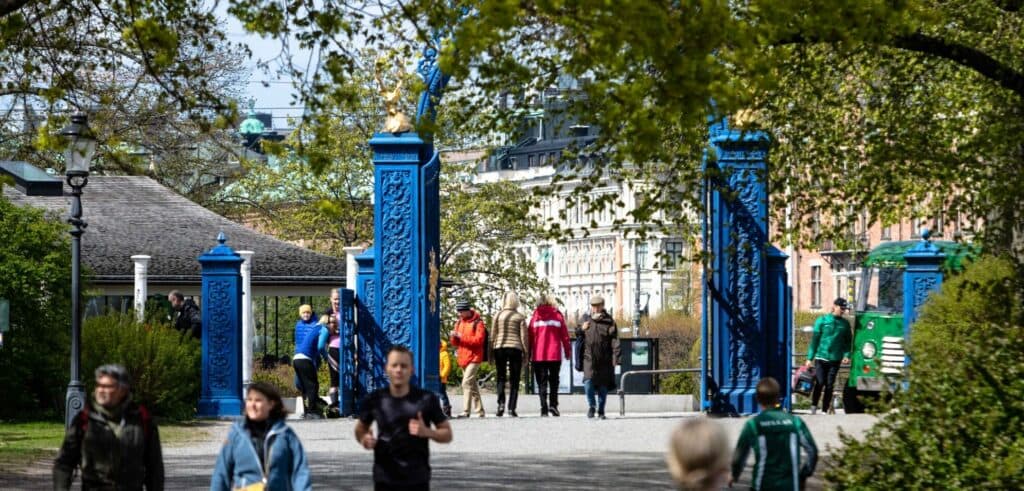
Entry to Royal Djurgården. Images courtesy Royal Djurgården Society.
Djurgården Shows How To Collaborate
When it came to planning for destination sustainability, the 60-plus businesses of Stockholm’s centuries-old Djurgården park posed a cooperation challenge. Camilla Zedendahl and Karin Sallander of the Royal Djurgården Society explain what it takes to help their park’s independent tourism enterprises think long-term together and act accordingly.
At Sweden’s Royal Djurgården, Destination Stewardship Began by Identifying Shared Values
Djurgården, one of the 14 islands that Stockholm is built upon, has served as Stockholmers’ entertainment oasis for hundreds of years. As far back as the 15th century, it was a royal playground, housing the Queen’s lions and royal hunting grounds, while common folk were drawn to its taverns and inns. Over time, it has grown to include 22 museums, a variety of theaters, music venues, and dance halls, an amusement park, several gardens, some thirty restaurants, as well as vast green areas rich with wildlife. Today, it draws 15 million visitors a year.
Those centuries have left their mark, shaped the destination, and provided us operating here with a long-term perspective. Now, as we think 400 years ahead, we know our way of managing and developing Djurgården must be done sustainably.
But how to get more than 60 individual attractions to work more closely together?
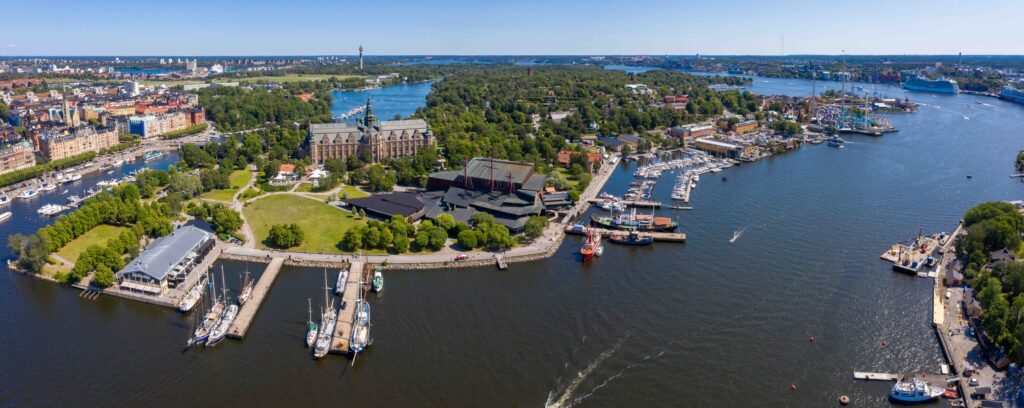
Royal Djurgården, a destination within the capital city of Stockholm, is visited by 15 million people a year.
Finding a Model for Destination Stewardship
Taking on the responsibility of stewardship for Royal Djurgården are the destination management organization – the Royal Djurgården Society (in Swedish, Kungliga Djurgårdens Intressenter) – and the Royal Djurgården Administration (Kungliga Djurgårdens förvaltning).
Despite the Royal Djurgården Society having no direct power and limited resources, our challenge was to help the individual attractions find ways to grow and develop, while keeping with the historical values and traditions we are responsible for protecting for future generations, all sustainably.
The core of the collaboration at Djurgården was finding the starting point in shared values. By disregarding traditional marketing and addressing specific target groups, and instead focusing on cooperation, opportunities were created to work towards a stronger destination – and towards acting collectively based on shared values. Notably, this was done without fear of overshadowing individual brands.
Agreeing on a Common Destination Identity
In 2016, the attractions at Djurgården started working on a common identity, asking questions like: What is Djurgården? What do we stand for? What does it mean to be part of Djurgården? And what does collaboration mean to us operating here? Agreeing on five shared values has been central:
- Open, accessible, welcoming
- Constantly evolving
- Thinking long-term
- Protecting our cultural heritage and looking ahead
- Working and evolving together
Together, we have determined that the responsibility for Djurgården is shared collectively, and collaboration is our driving force for development. We all face significant challenges, and the future is determined by how we act today. Therefore, we must continually develop our work and our shared narrative together.
“A lighthouse for sustainable
destinations worldwide”
—Djurgården auditor review
The agreement set up is never to work together for the sake of it, but always to create or solve something that we can do better together than individually. Sustainable development fits into this category.
The Whole Is Greater Than the Sum of its Parts
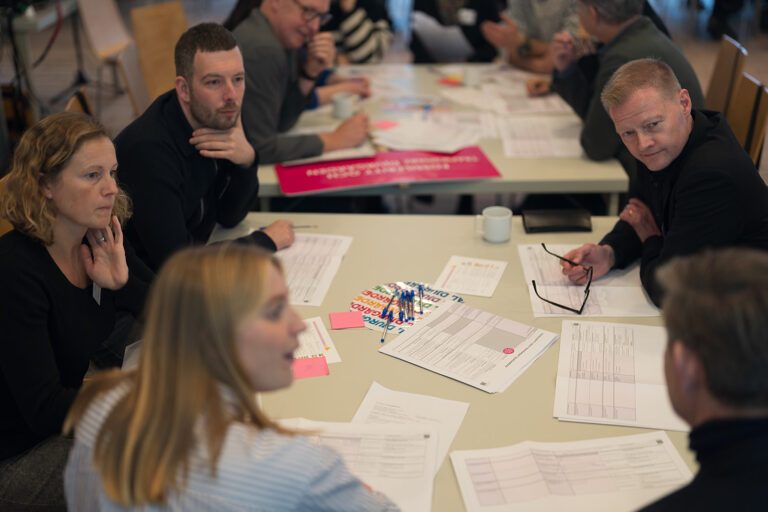
Royal Djurgården Society member meeting in 2022, gathering the 60 attractions in discussions on the set common goals.
The attractions at Royal Djurgården are very diverse – from Scandinavia’s most visited museums to small niche museums, and from the Michelin fine-dining restaurant to the one-man hot dog stand. Nonetheless, there are benefits for all in working together when focusing on issues where action by the whole is greater than the sum of its parts.
With the wide range of attractions, it is natural that the knowledge and practice in sustainability are on different levels. Some are champions and some are beginners. In working together and sharing knowledge, attractions can take turns pulling the work forward. With clear leadership from the Royal Djurgården Society, setting strategies, and keeping the destination together, there are no thresholds for joining the work. All are welcome.
Gathering the Destination’s Sustainability Champions
In 2018, the Royal Djurgården Society, supported by the Royal Djurgården Administration, created a dedicated sustainability team. It consists of representatives with leading positions within sustainability from the different attractions. The team is instrumental to the joint work. The dedicated sustainability team’s work includes initial visions and ideas, the development of strategies and concrete action plans, as well as planning and implementing initiatives. The sustainability team has consciously shared the work with all colleagues within the destination.
Taking valuable time out of their ordinary work to contribute to the common good gives the destination a unique and broad spectrum of knowledge. The commitment from the destination’s major players gives the mandate needed to drive the work forward – all for the benefit of Djurgården as a whole, as well as of the individual attractions.
Aiming for Common Sustainability Goals
Working on our common identity, we found we needed facts about the destination’s sustainability impact. The first step was to map it out by measuring through an inventory and analyzing our impact from the results. With that knowledge, we could make informed decisions about how to reduce negative and increase positive impacts.
The next step was to identify focus areas to work within:
- Fossil-free and traffic-smart Djurgården,
- A sustainable food culture,
- Open, accessible, and welcoming Djurgården, and
- A world exhibition on sustainability.
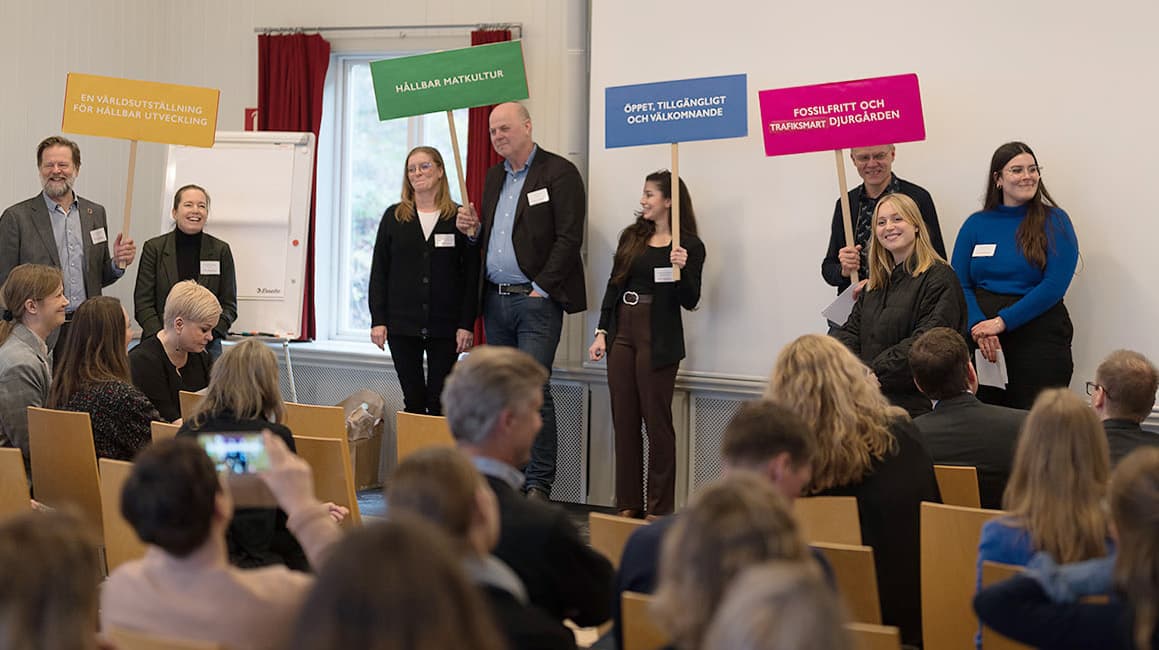
The four sustainability teams take shape.
Then we set short and long-term goals (targeting 2020, 2025, and 2027) for topics within each of those areas. This process took several years, partly due to the pandemic. The goals were adopted in 2022, and it is now mandatory for the 60-plus members of the Royal Djurgården Society to strive to achieve them. Our set goals are today the foundation for our destination sustainability work, and serve as the main strategic document going forward.
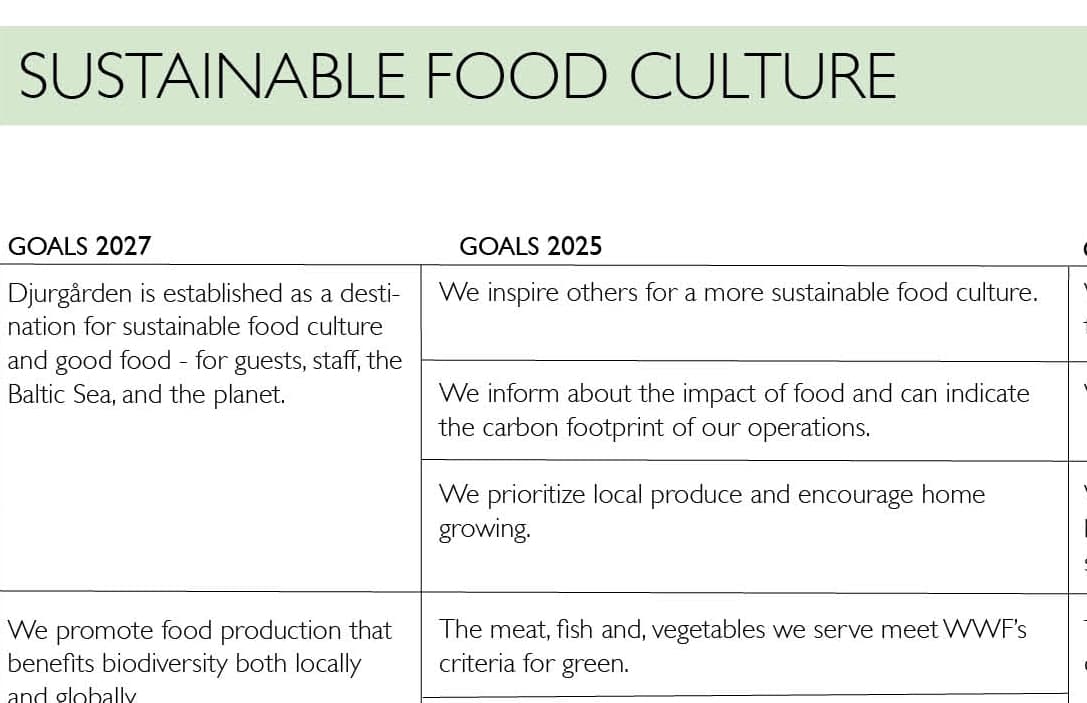
Sample excerpt from the Sustainable Food Goals.
Making the Most of a Crisis
The pandemic challenged the work plan. When the attractions were fighting for survival, the Royal Djurgården Society still had to ensure that the work continued, and no work was lost. The solution was not to pressure the struggling attractions, but rather get back to our core and prepare for re-opening.
For inspiration in tough times, we built a sustainability website with Djurgården’s attractions and other actors in the industry sharing good examples. It reports on the sustainability work at Djurgården (done, ongoing, and planned), whether jointly or by individual attractions. Good examples are shared to build pride, offer inspiration, and highlight how much work is being done. It contains a toolbox with templates to create a code of conduct and sustainability policy, common documents on commitments, sustainable events policy, and much more.
We are also highlighting other Swedish destinations’ sustainability work linking to inspiring examples where they generously share knowledge. The site launched in May 2021. We constantly renew the content. The sustainability site is now a valuable resource in the ongoing work.
Embracing the GSTC Criteria
Another way to use the sustainability work momentum during the pandemic was to seek a way to a wider view of what we do. We asked ourselves: How well does our work compare to the UN’s sustainability goals? How does our work compare to that of other destinations – nationally and globally?
In October 2021, we decided to explore this by joining the non-profit organization Green Destinations’ Award and Certification Program. As it is a program that reflects destinations’ sustainability work based on the UN’s 17 Sustainable Development Goals and the criteria presented by the Global Sustainable Tourism Council (GSTC) for sustainable tourism and destination stewardship, we would be able to view our efforts from a new, global angle.
Using the program’s digital tool, we have systematically reviewed and reported our sustainability work for more than 100 criteria and indicators. The resulting report covered just over 200 pages. In a review by the independent auditor in the summer of 2022, Emil Selse pointed to our common work as “a lighthouse for sustainable destinations worldwide where a destination included in a capital city can focus on all necessary issues in a structured way.”
Based on the findings of the revision, the Green Destinations Certification Committee awarded our efforts 9.4 out of 10 possible points, granting the Royal Djurgården Society the Green Destinations Platinum Award. In early 2023 the Royal Djurgården Society was awarded the Green Destinations Story Awards for strategic coworking methods and sustainable leadership.
Key Success Factors
Sharing some key success factors and lessons learned for Royal Djurgården Society
- Identity. We gathered around our strong brand as a destination, stating that long-term sustainable thinking is a part of our history and identity.
- Leadership through shared values and common goals. With limited resources and no official power the Royal Djurgården Society and the Royal Djurgården Administration get a mandate through consistency, clear, and attractive common goals.
- Structure and transparency, strict agendas, and scheduled meetings. Monthly meetings are held for members with sustainability as a standing item on the agenda.
- Role models. Building a team with champions of sustainability among the attractions.
- Generosity and courage. Building trust by creating a positive culture of generous knowledge-sharing within the destination and having the courage to act.
- Engagement, recognizing everyone’s views as important, and understanding that conditions are different among the attractions.
- Strong collaboration with organizations outside the destination for inspiration and practical tools.
- Flexibility. The ability to change focus in troubled times to keep the work going.
- Good cooperation with representatives and decision-makers from the City and Region of Stockholm.
Royal Djurgården and Beyond
With “working together” as a core value, cooperation naturally extends beyond our island’s shores, leveraging the power of collaboration both locally and globally. This includes forging partnerships with international and national organizations, as well as our counterparts in Stockholm. Through strong ties with Stockholm Business Region, the city’s tourism organization, we promote close collaboration and knowledge sharing. As Stockholm has committed to becoming one of the 100 EU Climate Neutral Cities by 2030, one of our contributions involves showcasing sustainable solutions to over 15 million visitors from Stockholm, Sweden, as well as every corner of the world. By actively contributing to the city’s strategies, we aspire to set an example for collaborative sustainability initiatives.
Thus, by agreeing on a new way of working with our shared place – through “co-creation” – we have a well-anchored and stable foundation; a clear direction in the collaborative work carried out together; and visitors have been provided with a destination they can relate to. The work continues on the journey we have embarked on together.
Addenda
- Our sustainability site illustrates our work on all levels.
- See also our sustainability film narrated by Björn Ulvaeus, known as a member of the musical group ABBA.
- Sample set of common goals:
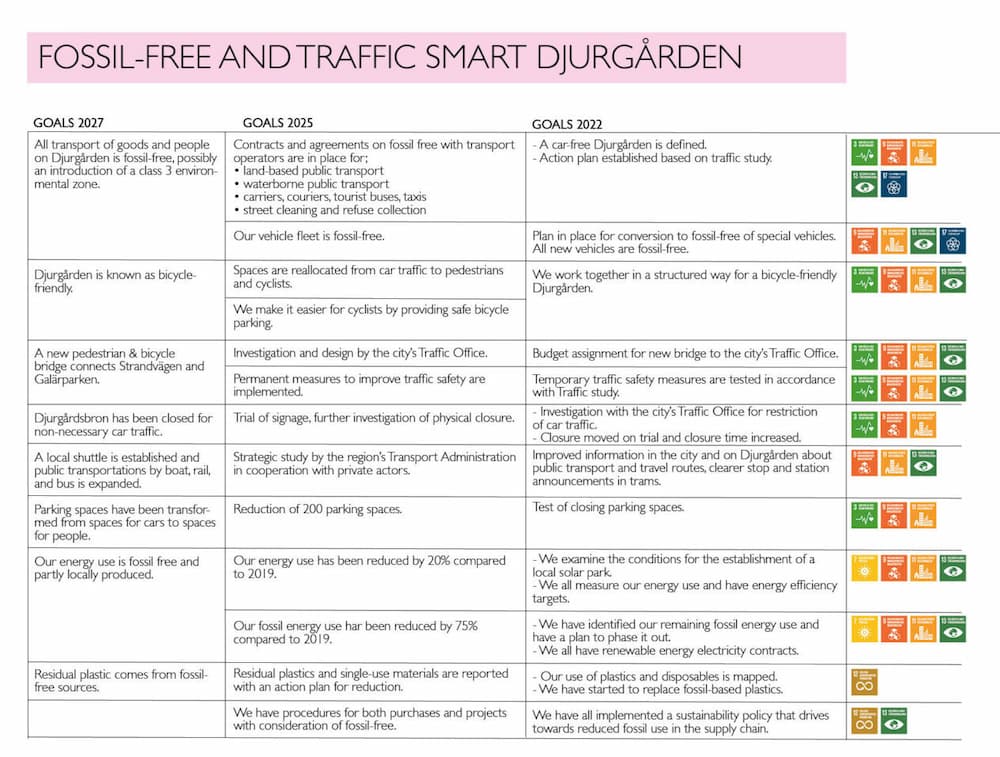
Common sustainability goals set for the Fossil-Free/Smart Traffic focus area.
- An exemplary collaboration for more sustainable tourism, of which we are immensely proud, involved Visit Sweden, Stockholm Business Region, the Swedish Agency for Economic and Regional Growth, and us. Together, we welcomed changemakers from around the world to the GSTC2024 Sweden Global Sustainable Tourism Conference at Royal Djurgården in April 2024.
About the Author
Camilla Zedendahl is CEO and Karin Sallander, project manager of the Royal Djurgården Society/Kungliga Djurgårdens Intressenter




